北师大版(2019)必修第三册 Unit 9 Learning Lesson 2 Language Learning Tips 课件(共18张PPT)
文档属性
| 名称 | 北师大版(2019)必修第三册 Unit 9 Learning Lesson 2 Language Learning Tips 课件(共18张PPT) |

|
|
| 格式 | pptx | ||
| 文件大小 | 13.2MB | ||
| 资源类型 | 教案 | ||
| 版本资源 | 北师大版(2019) | ||
| 科目 | 英语 | ||
| 更新时间 | 2024-03-12 13:21:39 | ||
图片预览

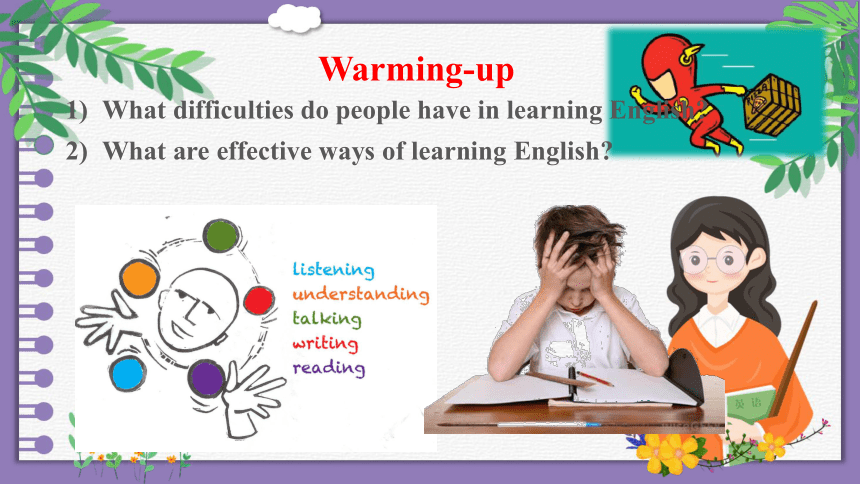
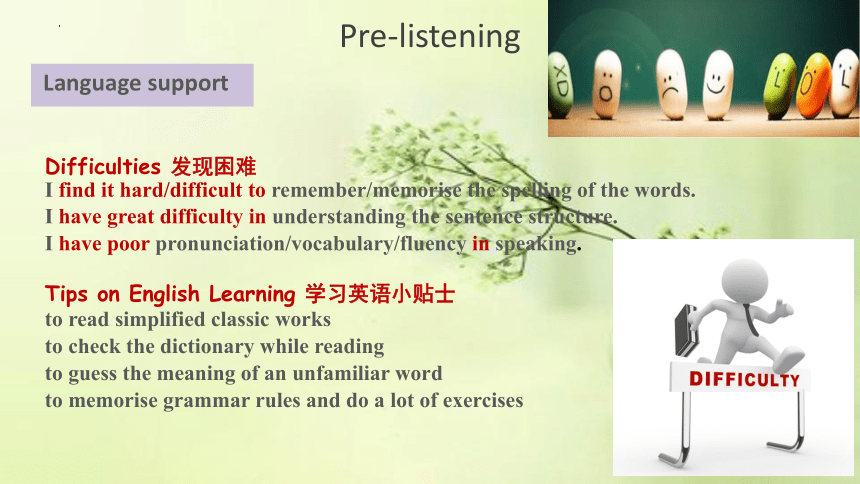
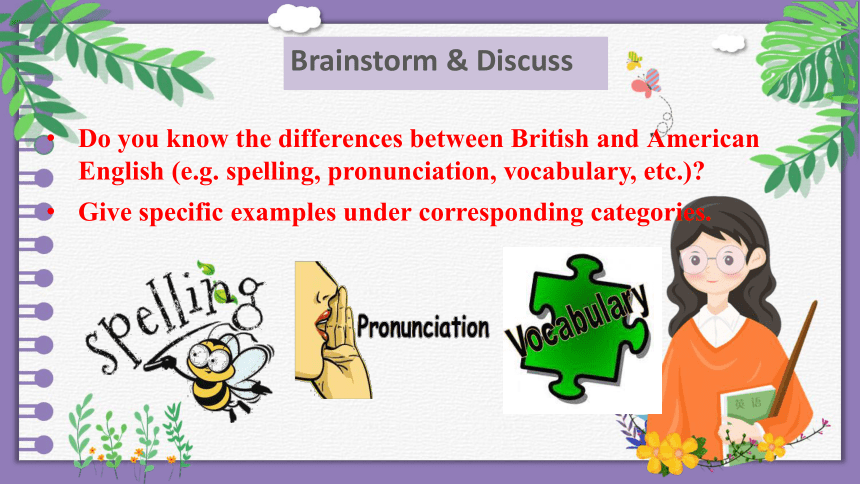
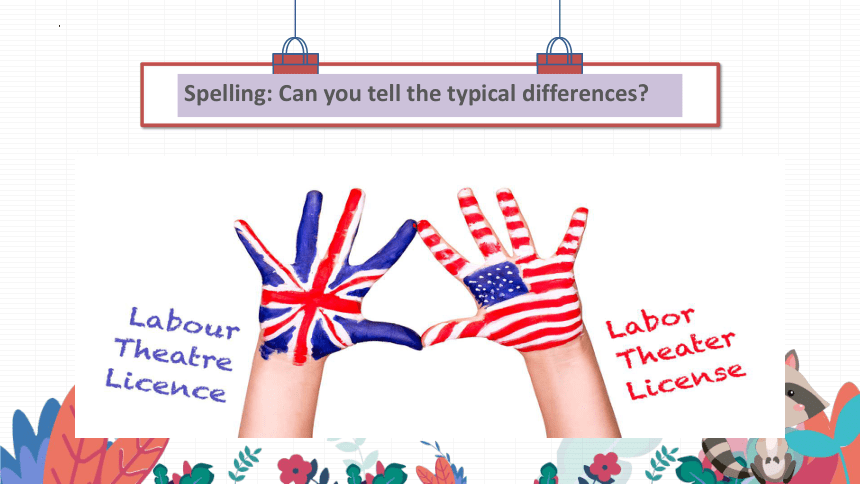
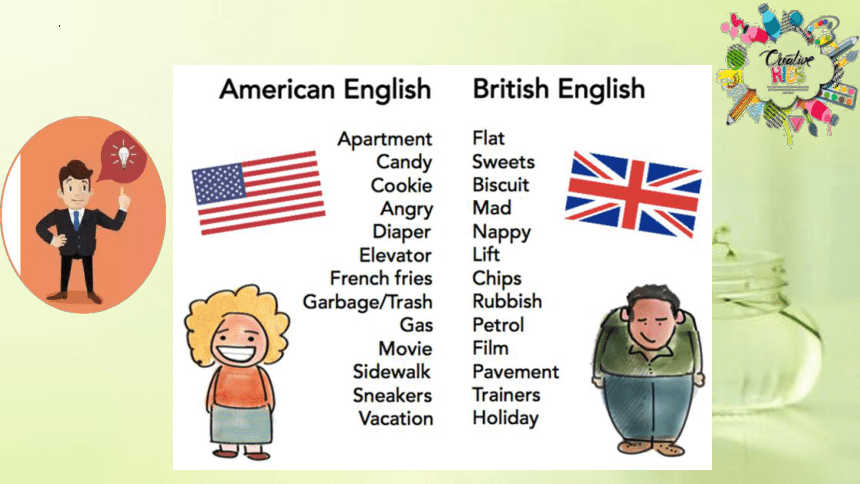
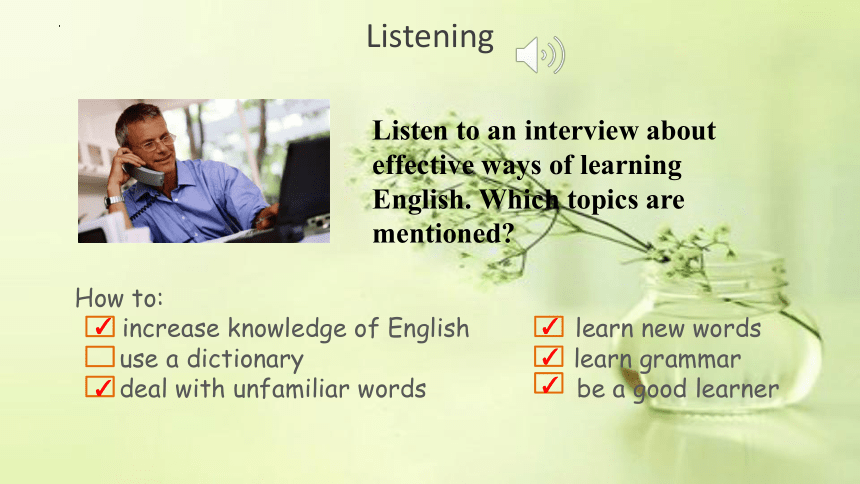
文档简介
(共18张PPT)
Unit 9 Learning
Lesson 2 Language Learning Tips
Warming-up
What difficulties do people have in learning English
What are effective ways of learning English
Difficulties 发现困难
I find it hard/difficult to remember/memorise the spelling of the words.
I have great difficulty in understanding the sentence structure.
I have poor pronunciation/vocabulary/fluency in speaking.
Tips on English Learning 学习英语小贴士
to read simplified classic works
to check the dictionary while reading
to guess the meaning of an unfamiliar word
to memorise grammar rules and do a lot of exercises
Pre-listening
Language support
Brainstorm & Discuss
Do you know the differences between British and American English (e.g. spelling, pronunciation, vocabulary, etc.)
Give specific examples under corresponding categories.
Spelling: Can you tell the typical differences
Listen to an interview about effective ways of learning English. Which topics are mentioned
How to:
increase knowledge of English learn new words
use a dictionary learn grammar
deal with unfamiliar words be a good learner
Listening
Dr. Smith’s advice is to ____________________ of English beyond the classroom. One way to do that is ______________. He recommends that you try ________________________. The other way is to __________.
increase your knowledge
listen more
by reading more
simplified classic literature
What is Dr. Smith’s advice on effective English learning
Listening
Listen again. Complete the missing information
Firstly, you should ____________________. A lot of the time, you’ll be able to _________________ of an unfamiliar word without ____________.
Also, you should learn ______________. For example, we say “open the book”, but “turn on the computer”.
guess the meaning
words in chunks
learn words in context
looking it up
What is his suggestion on learning words
Listening
Just memorising the rules is _________. His advice is that when you learn a grammar rule, you should try to use it in ___________________________. By doing so, you’ll be learning grammar in a more natural way than from a grammar book.
speaking and writing activities
not helpful
What advice does he give on learning grammar
Listening
Aspects Examples
ways of pronouncing water, tomato …
uses of words
subway, underground, tube
example, dancing in the classroom
Listening
Listen to the plete the notes in the table
–We have different ways of pronouncing words. For example, …
–That’s odd! __________________________!
Do they still mean the same thing
–I say “example” and “dancing in the classroom”, but Robert …
–__________! How do people …
–We say “lift”, but Americans say “elevator”.
–__________!
–The American “subway” is called the “underground” in the UK, or the “tube” in London.
–__________! I never realised …
Wow
They sound so different
Ah
Interesting
They sound so different
Ah/Wow
Interesting
Wow/Ah
Listening
Listen and plete the sentences in the Talk Builder.
Language use—Showing interest
在对话时,为了表示你对谈论的话题有兴趣,可以时不时说一些单词或小短句,使对话愉快、顺利地进行下去。
Exactly!
You’re right!
You’re kidding!
I know what you mean.
No way!
I see.
Really
Interesting!
Wow!
I can’t believe it!
Great!/Super!
That’s interesting.
Wow! Tell me about it!
How amazing!
That’s terrible!
Oh, yes.
They sound so different.
That’s odd.
Vocabulary Learning—acquire
【释义】
v. to gain sth by your own efforts, ability or behaviour 获得;取得; 学到
【例句】
I tried to acquire the information I needed.
我千方百计地搞到了我所需要的资料。
She has acquired a good knowledge of English.
她英语已经学得很好了。
【派生词】acquisition n. 取得,获得
【词义辨析】
acquire 取得,获得,学到,如:acquire knowledge (获得知识)
inquire 打听,询问,如:inquire a person’s name (问姓名)
achieve 完成,实现,如:He will never achieve anything unless he works harder. (如果不努力工作,他会一事无成。)
require 需要,如:We require more help. (我们需要更多帮助。)
acquire
/ kwa /
Vocabulary Learning—memorise
【释义】
vt. to learn something carefully so that you can remember it exactly 记住;熟记
【例句】
He studied his map, trying to memorise the way to Rose’s street.
他研究了地图,努力记住去罗丝家那条街的路。
They were asked to memorise and identify unfamiliar faces.
他们被要求记住和辨认不熟悉的面孔。
【同根词】memory n. 记忆,记忆力;memorial n. 纪念碑;纪念物
【词语辨析】remember, memorise, remind
这组词都有“记忆,记住,回忆”的意思,其区别是:
remember 含义较广,多指无意识地回忆起往事,也可指通过主观努力去记忆;
memorise 指有意识的下功夫把某事的整个细节都记在脑子里;
remind 指经某人或某事的提醒而回忆起某件已遗忘之事。
memorise
/ mem ra z/
Vocabulary Learning—recommend
【释义】
v. to tell sb. that sth. is good or useful, or that sb. would be suitable for a particular job, etc. 建议;推荐;介绍
【例句】
Can you recommend a good hotel
你能推荐一家好的饭店吗?
The report recommended a 10% pay increase.
报告提议工资增加10%。
【常用搭配】
[+ sb./sth. (to sb.)]
I recommend the book to all my students.
我向我所有的学生都推荐这本书。
【词义辨析】劝告、主张、建议:propose, suggest, recommend
propose 多指较正式地提出建议;
suggest 语气较委婉,指提出不成熟的建议或参见意见;
recommend 指向对方提出公开的建议或规劝。
recommend
/rek mend/
Vocabulary Learning—unfamiliar
【释义】
adv. know nothing or very little about it 不熟悉的,不了解的
【例句】
She speaks no Japanese and is unfamiliar with Japanese culture.
她不会说日语并且不熟悉日本文化。
We got lost in this unfamiliar city.
在这个陌生的城市里我们迷路了。
He also has some unfamiliar problems to deal with.
但他还有一些不熟悉的问题需要处理。
【近义词】unknown adj. 未知的,不了解的
【常用搭配】
[be unfamiliar with]
Since you’ve just started working, you must be unfamiliar with the situation.
刚开始工作你肯定还不太熟悉。
unfamiliar
/ nf m li /
Thank You !
Unit 9 Learning
Lesson 2 Language Learning Tips
Warming-up
What difficulties do people have in learning English
What are effective ways of learning English
Difficulties 发现困难
I find it hard/difficult to remember/memorise the spelling of the words.
I have great difficulty in understanding the sentence structure.
I have poor pronunciation/vocabulary/fluency in speaking.
Tips on English Learning 学习英语小贴士
to read simplified classic works
to check the dictionary while reading
to guess the meaning of an unfamiliar word
to memorise grammar rules and do a lot of exercises
Pre-listening
Language support
Brainstorm & Discuss
Do you know the differences between British and American English (e.g. spelling, pronunciation, vocabulary, etc.)
Give specific examples under corresponding categories.
Spelling: Can you tell the typical differences
Listen to an interview about effective ways of learning English. Which topics are mentioned
How to:
increase knowledge of English learn new words
use a dictionary learn grammar
deal with unfamiliar words be a good learner
Listening
Dr. Smith’s advice is to ____________________ of English beyond the classroom. One way to do that is ______________. He recommends that you try ________________________. The other way is to __________.
increase your knowledge
listen more
by reading more
simplified classic literature
What is Dr. Smith’s advice on effective English learning
Listening
Listen again. Complete the missing information
Firstly, you should ____________________. A lot of the time, you’ll be able to _________________ of an unfamiliar word without ____________.
Also, you should learn ______________. For example, we say “open the book”, but “turn on the computer”.
guess the meaning
words in chunks
learn words in context
looking it up
What is his suggestion on learning words
Listening
Just memorising the rules is _________. His advice is that when you learn a grammar rule, you should try to use it in ___________________________. By doing so, you’ll be learning grammar in a more natural way than from a grammar book.
speaking and writing activities
not helpful
What advice does he give on learning grammar
Listening
Aspects Examples
ways of pronouncing water, tomato …
uses of words
subway, underground, tube
example, dancing in the classroom
Listening
Listen to the plete the notes in the table
–We have different ways of pronouncing words. For example, …
–That’s odd! __________________________!
Do they still mean the same thing
–I say “example” and “dancing in the classroom”, but Robert …
–__________! How do people …
–We say “lift”, but Americans say “elevator”.
–__________!
–The American “subway” is called the “underground” in the UK, or the “tube” in London.
–__________! I never realised …
Wow
They sound so different
Ah
Interesting
They sound so different
Ah/Wow
Interesting
Wow/Ah
Listening
Listen and plete the sentences in the Talk Builder.
Language use—Showing interest
在对话时,为了表示你对谈论的话题有兴趣,可以时不时说一些单词或小短句,使对话愉快、顺利地进行下去。
Exactly!
You’re right!
You’re kidding!
I know what you mean.
No way!
I see.
Really
Interesting!
Wow!
I can’t believe it!
Great!/Super!
That’s interesting.
Wow! Tell me about it!
How amazing!
That’s terrible!
Oh, yes.
They sound so different.
That’s odd.
Vocabulary Learning—acquire
【释义】
v. to gain sth by your own efforts, ability or behaviour 获得;取得; 学到
【例句】
I tried to acquire the information I needed.
我千方百计地搞到了我所需要的资料。
She has acquired a good knowledge of English.
她英语已经学得很好了。
【派生词】acquisition n. 取得,获得
【词义辨析】
acquire 取得,获得,学到,如:acquire knowledge (获得知识)
inquire 打听,询问,如:inquire a person’s name (问姓名)
achieve 完成,实现,如:He will never achieve anything unless he works harder. (如果不努力工作,他会一事无成。)
require 需要,如:We require more help. (我们需要更多帮助。)
acquire
/ kwa /
Vocabulary Learning—memorise
【释义】
vt. to learn something carefully so that you can remember it exactly 记住;熟记
【例句】
He studied his map, trying to memorise the way to Rose’s street.
他研究了地图,努力记住去罗丝家那条街的路。
They were asked to memorise and identify unfamiliar faces.
他们被要求记住和辨认不熟悉的面孔。
【同根词】memory n. 记忆,记忆力;memorial n. 纪念碑;纪念物
【词语辨析】remember, memorise, remind
这组词都有“记忆,记住,回忆”的意思,其区别是:
remember 含义较广,多指无意识地回忆起往事,也可指通过主观努力去记忆;
memorise 指有意识的下功夫把某事的整个细节都记在脑子里;
remind 指经某人或某事的提醒而回忆起某件已遗忘之事。
memorise
/ mem ra z/
Vocabulary Learning—recommend
【释义】
v. to tell sb. that sth. is good or useful, or that sb. would be suitable for a particular job, etc. 建议;推荐;介绍
【例句】
Can you recommend a good hotel
你能推荐一家好的饭店吗?
The report recommended a 10% pay increase.
报告提议工资增加10%。
【常用搭配】
[+ sb./sth. (to sb.)]
I recommend the book to all my students.
我向我所有的学生都推荐这本书。
【词义辨析】劝告、主张、建议:propose, suggest, recommend
propose 多指较正式地提出建议;
suggest 语气较委婉,指提出不成熟的建议或参见意见;
recommend 指向对方提出公开的建议或规劝。
recommend
/rek mend/
Vocabulary Learning—unfamiliar
【释义】
adv. know nothing or very little about it 不熟悉的,不了解的
【例句】
She speaks no Japanese and is unfamiliar with Japanese culture.
她不会说日语并且不熟悉日本文化。
We got lost in this unfamiliar city.
在这个陌生的城市里我们迷路了。
He also has some unfamiliar problems to deal with.
但他还有一些不熟悉的问题需要处理。
【近义词】unknown adj. 未知的,不了解的
【常用搭配】
[be unfamiliar with]
Since you’ve just started working, you must be unfamiliar with the situation.
刚开始工作你肯定还不太熟悉。
unfamiliar
/ nf m li /
Thank You !
同课章节目录
- Unit 7 Art
- Lesson 1 Masterpieces
- Lesson 2 Beijing Opera
- Lesson 3 A Musical Genius
- Unit 8 Green living
- Lesson 1 Roots and Shoots
- Lesson 2 Greening the Desert
- Lesson 3 "White Bikes" on the Road
- Unit 9 Learning
- Lesson 1 Active Learning
- Lesson 2 Language Learning Tips
- Lesson 3 The Secrets of Your Memory
